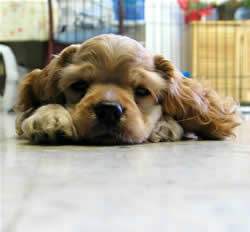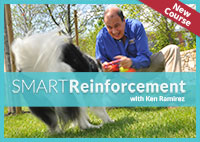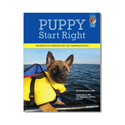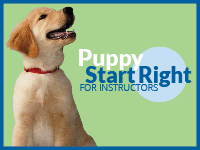Q: My puppy loves being in his puppy pen in the TV room, which is one of those foldable metal fences, open on the top. He hates his actual crate, which is a metal cage for dogs, quite large, with plenty of room. I can get him to go quietly into it if I give him a wildly desirable treat.
But once the treat is gone, so is his patience for the crate. I try to go in to release him only when he is being quiet, and I'm trying to work up the time he spends in the crate. Also I try to put him in the crate at "sleepy" times. But the crate training is so hard to do emotionally...he yowls! He is lonely and bewildered...he can't be loose in the house, because he chews and eliminates. So we are working on the house-breaking and chew-toy training. He is a whiz at clicker training though, and only 8 weeks old!

A: Here is something I tried with a puppy recently and it seemed to work very well. Once the puppy runs into the crate, eats his treat and turns around to come out the door, say "wait," close the crate door and then open it. Don't lock the door or leave it shut even for a second. Just tap it shut, click the clicker, open the door, and treat him when he comes out.
Do this a few times until you can see his little puppy brain start to work. Then, the next time you do it, say "wait," count one or two seconds, click the clicker, open the door, and give him a treat when he comes out. Each time (maybe 2-3 times a day), increase the number of seconds very gradually (by one or two seconds) until you get to 30 seconds. Then you can start increasing it by 5-10 seconds at a time. I find that I have to work very, very gradually in the beginning, maybe even not increasing it at all for several times in a row, but once I get to a few minutes, I can increase the time by 5 minutes at a time, and it's much easier. Later I can increase it by 10-15 minutes at a time.
I actually set a kitchen timer to the desired time so I don't forget and leave him in there forever, because I want to let him out BEFORE he gets impatient and starts whining. I don't open the door as soon as the timer goes off, because I don't want him to think that the timer is the click.
You can see that after a while, this becomes a game to the puppy and he is willing to perform the "wait" for a wonderful treat. To make it even easier for him to wait, you can start adding desired things like chew toys to the inside of the crate.
With my dogs, I always give them certain toys in the crate that they can't take out with them when they leave, such as rawhide chews. I just remove the rawhide as they exit. Then you can put chew toy back in there and shut the door to the crate when they exit the crate. After a while, they will ask to go in the crate so they can play with the toy.
You don't have to keep any of these training methods up forever. You don't need to, after you have created the positive associations.
Done properly, dogs just adore their crates and will opt to enter them all the time. I generally leave all the crate doors open with a dog bed inside, and I always feed them in their crates, with or without the doors open, and they really love them. I never knew that dogs could love their crates so much. It wasn't until I had a puppy chewing electrical cords when I was asleep and I couldn't do anything to stop him that I turned to crates. The motivator for me was when I smelled smoke in my room and decided it was more humane to crate train him than to turn him in to the dog pound or let him burn us all up.The one thing that might be technically wrong with my method is that I add the verbal cue first, before he's learned the "wait" behavior. But at least it works!








My Shih Tzu Doesn't like my Husband
I have a 2 year old Shih Tzu. I got her from somebody 5 months ago. She is sweet to me and others,but barks and growls at my husband,but the funny thing is she will eat out of his hand then back up and growl at him. She will sometimes go to him to be petted without food and then back up and growl at him. If he is sitting she is fine.If he starts moving around the house she growls and barks.When he comes home from work she barks at him until I can try and calm her. I can't believe my husband has put up with her this long. But it's frustrating to me and him. I also have to say when we got her she was in pre-heat then she got pregnant,had 4 pups (Got Father fixed 5 days ago) And is now back in pre-heat. I know all those hormones can't help the situation,but I know thats not the underlining behavior. Was she abused by a male before we got her? I don't know. She seems to be ok with most other males. I need help before my husband no longer wants to put up with her.
house training
We recently purchased a 3 month old beautiful Yorkshire Terrier puppy name Max a month ago. We thought we had him crate trained till yesterday and today. He started doing number 2 in his crate. I read somewhere that if a dog does that he will always be a dirty dog, please tell me this is not the case. We love this little dog and is a great addition to our family. We take him out twice in the morning, twice in the afternoon and twice in the eveing. Please tell me what I can do to fix this problem, all sugestions are welcome.
Don't expect a 100% accident
Don't expect a 100% accident free dog for the first 6 months - he may catch your meaning much sooner if he's smart like yours seems to be, but he just won't have the physical ability to perfectly control his eliminations and he may not always understand what you want. He's still a young puppy :) I can understand your frustration - I got a half-feral boxer puppy from a very irresponsible breeder 10 years ago and I can tell you that for the first few months I would literally break down crying at the end of the day sometimes, from the effort of correcting all his bad behaviour. Then, with tons of patience and work, he turned from a hyper-excitable won't-listen-to-anything crazy dog to a wonderful, charming, obedient, family dog.
I don't know the circumstances of the first time, so it may simply have been an accident, and the repeat may have happened if the crate wasn't properly sanitized, as the smell will trigger olfactory responses (remember, most cleaning products will not eliminate the odour from dog's sensitive noses - white vinegar and biological cleaning agents work well). The reasons could also be if the crate is large, if he was in the crate much longer than usual or after he was excited/eating/sleeping (that's when they most need to go), or any number of reasons. I'd suggest taking a step or two back in his house training - depending on the methods you used, just go back to the basics for a while to reinforce the behavior you want. Don't think of it as "starting from scratch" - just remember that this is a tiny puppy who is learning an awful lot in a very short span of time :) Don't feel too let down by accidents like this - he is only 3 months old, so he's still learning and still doesn't have the best control over his bodily functions. You can train him to be the perfect dog you want, you just need to believe in yourself and keep working!
Crate and Me
I have a stray, probably between 4 and 6 months old. He likes his crate...but he poops and pees in it at night. He'll gladly lie in it with the door closed and sleep like a baby...until I go out of the room or the house. Then I can hear him bark. And bark. And bark. All night.
In the morning I'll find poop and pee in the crate...though he hides it.
It's just with me. When my wife enters and leaves...there's no problem. He's hooked on me and when I go upstairs to go to sleep...bark bark bark. Other than this, he's great.
Though it'd be nice if he'd pee outside...just once...so we could praise him. He was in a kennel for 3 weeks before we took him and he seemed to have picked up the habit of going where he sleeps when nobody's watching. Would really like to fix that 'cause it's a real mess.
Any advice? Please.
Crate Training
I also have a puppy who is used to the door being open all the time in the crate. He is confined to the kitchen when I am gone and does use a puppy pad. He is a 11 week old Shih Poo. My problem occurs when we travel in the car and I put him in the crate and shut the door. Since he is not used to the closed door, he howls and bites at the bars and is very distressed. He only started doing this several weeks ago and seemed to be OK with the door closed before that. Since I can't come home during the day, I can't close the door all day and he does seem happy with the crate while I am gone and all night, but the door is open. What can I do about traveling with the crate. I hate to close the door now while I am gone or at night when he is OK. Any advice? Should I buy a car harness and booster seat for traveling instead of the crate?
Closing the door on the crate.
I obtained a puppy 3 ays ago, she was in a play pen open topped cage with her letter mates. I had to put her into a crate to bring her home - a journey of 6 hours.
I have to leave her in her crate overnight, because of house alarms and the possibility of chewing and eliminating. From the very first night she has howled when the crate door is shut. During the day, I can coax her into the cage and she will happily sleep in it IF the door is left open.
If I close the door, she howls and bites at the bars. She becomes very distressed.
How can I get her to accept the door being closed, especially as I have to close it every night.
At night she will eventually stop howling and go to sleep. I do get up every three to four hours to let her outside to eliminate.
On the first evening, whilst trying to get her accustomed to having the door closed, she immediatley pood inside, so I removed that and put her back in and she immediatly did another and tried to do it again on the third attempt.
She is a Spanish water dog
Closing the door on the crate
Have you been able to solve this..I have a similar problem.
Post new comment